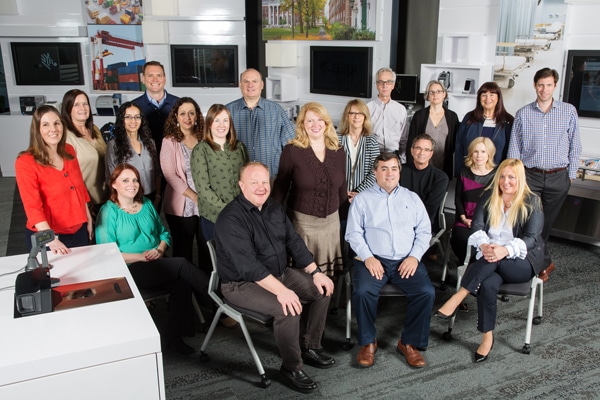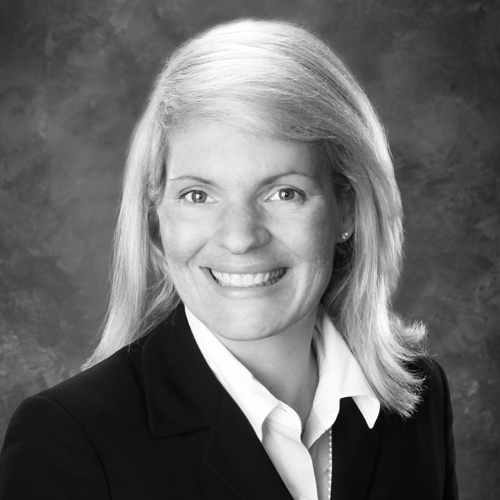
It can often be tough coming into an established team as a complete outsider, but it proved to be an advantage for Cristen Kogl when she joined Zebra Technologies Corporation, in 2015. The company had acquired Motorola Solutions’ Enterprise business in October 2014, for $3.45 billion, so when Kogl arrived, she suddenly found herself the new leader to a legacy Motorola group. It was her independent perspective that allowed her to approach the group and the new company respectfully to find the best solutions for their newly merged work.
“I was the tether that attached back to what was the historic Zebra mothership, even though that’s not where I came from,” Kogl says. “I wasn’t painted with one brush or another. I could just look at both businesses and say, ‘How do we move forward?’”
Since the acquisition, Zebra has transitioned from a product company to an enterprise asset intelligence and solutions company. In that time, Kogl, vice president, assistant general counsel, and assistant corporate secretary, has worked with her newly merged team—which has grown to include legacy Zebra employees and new hires as well—to wholly restructure certain practices and policies of Zebra’s legal department to take a unified, transparent approach.
Part of her team’s challenge was to integrate Motorola’s culture of rigor and Zebra’s culture of entrepreneurial agility—a task made difficult by the natural initial wariness of counsel from both organizations. “Lawyers are trained to be skeptical,” Kogl says. “As part of our schooling, we look at things a bit cynically.” So, to successfully create a new organizational structure, team members had to assume their new colleagues had the best intentions, even when their priorities appeared different. “Assuming positive intent was a great cultural way to look at what everyone was bringing to the table and say, ‘We’re all doing this for the betterment of Zebra,’” Kogl says.
Her colleagues feel similarly. “After spending ten years supporting various businesses at Motorola, it was a real shift to support an organization that was genuinely interested in innovative ideas and processes that support the corporation’s goals and fit the ‘One Zebra’ cultural initiative,” says Andrew Soderna, senior commercial counsel for Zebra, who joined as part of Motorola’s Enterprise business.
The legal corporate and commercial practices group is today made up of twelve women and eight men from a range of backgrounds, and this diversity has contributed to their ability to successfully dialogue. “Having people from different backgrounds—be it gender, religion, or national heritage—makes for a more fruitful discussion and getting to a better solution,” Kogl says, adding that teamwork is essential, which, at a company called Zebra, makes sense. “Zebras survive in part because they work together as part of a group. A big part of why we succeed is because we grow and learn from each other.”
To further foster this atmosphere of mutual education, each year, Kogl’s team focuses on one of the company’s five core values: teamwork, accountability, agility, integrity, and innovation. In 2017, its members turned their attention to accountability, asking, “How am I accountable to myself, to my teammates, and to my clients?”
Holding oneself accountable to tight deadlines is admirable but not always realistic, so instead of focusing only on deadlines and goals met, Kogl’s team concentrated on communication. “There are going to be peaks and valleys in everybody’s work schedule,” she says. “When you have a valley, you can pick up somebody else’s work or take an assignment. But, when you have a peak, you know that to do your best work, you have to have a bit of breathing space and time to be creative and think through the puzzle. It’s about being able to acknowledge that, share burdens, and work collectively.”
Kogl’s colleagues appreciate this atmosphere of continual learning. “Cristen personifies the phrase ‘lead by example,’” says Pat Kall, senior director and corporate counsel. “She is acutely inquisitive and inspires each of us to learn something new every day and to pass on the information we uncover creating within her team, a collaborative network of experts in many disciplines.”
In addition to reworking its culture, Kogl’s team has reworked many of its processes, including those tied to global nondisclosure agreements. It devised a system based on the contract-management program Zebra licenses, which uses smart fields and drop-down texts. This allowed employees around the world to create most of their own nondisclosure agreements (NDAs) without needing to consult Zebra’s legal department. And, for issues that would need the legal department’s input, Kogl trained a group of paralegals. Now, Zebra’s lawyers are involved in less than 5 percent of the more than one thousand commercial NDAs the company does each year.
“We’ve been able to be more effective and efficient by spending the time to think through the process, spending the time to come up with the right approach while still protecting our interests, and making it easily available for employees to understand how to use it,” Kogl says.
Her team also oversees privacy and security programs for Zebra, and in 2015 it launched an annual summit on the subject. It brings together a cross-functional team of employees from all regions to discuss privacy regulations and security implications, and like the legal team’s other efforts, it has succeeded by bringing people together to collectively get a better look at the big picture.
Ariel Dvorkis, senior counsel and global channel lead, has experienced this collective global mind-set firsthand. “As Cristen’s team member, I’ve been leading the support of our global channel organization,” she says. “Collaborating with colleagues from all regions, with diverse backgrounds and cultures, we created global templates that make it easier to do business with Zebra on a global scale.”
Kogl continues to be impressed with all that her group is capable of. “I am amazed at how a team of twenty people is able to engage a company of nearly seven thousand and have such an impact,” Kogl says. “Sometimes you get deeply engaged in the depths of a company and you wonder, ‘Does my work really impact the business?’ At Zebra, it’s so evident that it does.”
Photo by Rich Chapman


